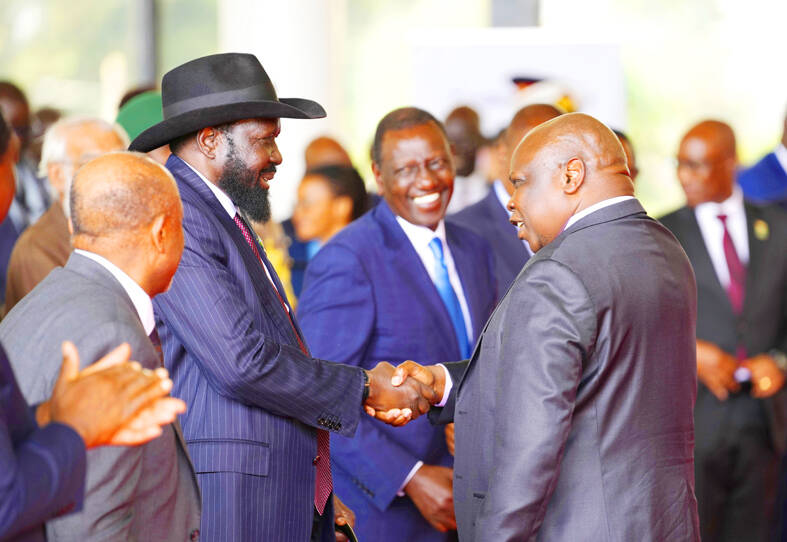South Sudan peace talks that almost reached completion faced a stumbling block, with opposition groups demanding that a newly passed bill allowing the detention of people without an arrest warrant be scrapped before they would sign a proposed deal.
Kenya has been hosting the high-level meetings since May between government representatives and rebel opposition groups who were not part of a 2018 agreement that ended a five-year civil war, leaving about 400,000 people dead and millions displaced.
Despite the agreement, violence often erupted in the country of 9 million people.

Photo: AP
Pagan Amum Okiech, negotiating on behalf of the South Sudan Opposition Movement Alliance, told reporters on Tuesday that it would be “meaningless to sign any agreement if the draconian National Security Act is signed into law by the president.”
Last week, parliament voted in favor of the 2015 bill and South Sudanese President Salva Kiir has to approve it within 30 days for it to become law.
This comes ahead of the country’s first-ever election on Dec. 22.
“This law violates the fundamental rights and freedoms of South Sudanese citizens, it eliminates civic and political space,” Amum said. “There can be no peace or democracy under such a law.”
Attending the peace talks is Edmund Yakani, executive director of the Community Empowerment for Progress Organization, a non-profit that engages university students and fresh graduates.
Yakani said that the security bill “created a negative spirit for the negotiations.”
Human Rights Watch has also called on Kiir to reject the bill, saying that it would further undermine human rights and boost national security agencies that have a history of rights abuses.
The talks have resulted in a draft agreement proposing to extend the country’s transitional period and postpone the election to allow finishing up the country’s constitution and electoral laws, as well as set up constituency borders and a unified security force as proposed in the 2018 peace talks.
Some Western envoys also recommend delaying the poll “to guarantee a free and fair election.”

MAKING WAVES: China’s maritime militia could become a nontraditional threat in war, clogging up shipping lanes to prevent US or Japanese intervention, a report said About 1,900 Chinese ships flying flags of convenience and fishing vessels that participated in China’s military exercises around Taiwan last month and in January last year have been listed for monitoring, Coast Guard Administration (CGA) Deputy Director-General Hsieh Ching-chin (謝慶欽) said yesterday. Following amendments to the Commercial Port Act (商港法) and the Law of Ships (船舶法) last month, the CGA can designate possible berthing areas or deny ports of call for vessels suspected of loitering around areas where undersea cables can be accessed, Oceans Affairs Council Minister Kuan Bi-ling (管碧玲) said. The list of suspected ships, originally 300, had risen to about

DAREDEVIL: Honnold said it had always been a dream of his to climb Taipei 101, while a Netflix producer said the skyscraper was ‘a real icon of this country’ US climber Alex Honnold yesterday took on Taiwan’s tallest building, becoming the first person to scale Taipei 101 without a rope, harness or safety net. Hundreds of spectators gathered at the base of the 101-story skyscraper to watch Honnold, 40, embark on his daredevil feat, which was also broadcast live on Netflix. Dressed in a red T-shirt and yellow custom-made climbing shoes, Honnold swiftly moved up the southeast face of the glass and steel building. At one point, he stepped onto a platform midway up to wave down at fans and onlookers who were taking photos. People watching from inside

Japan’s strategic alliance with the US would collapse if Tokyo were to turn away from a conflict in Taiwan, Japanese Prime Minister Sanae Takaichi said yesterday, but distanced herself from previous comments that suggested a possible military response in such an event. Takaichi expressed her latest views on a nationally broadcast TV program late on Monday, where an opposition party leader criticized her for igniting tensions with China with the earlier remarks. Ties between Japan and China have sunk to the worst level in years after Takaichi said in November that a hypothetical Chinese attack on Taiwan could bring about a Japanese

STREAMLINED: The dedicated funding would allow the US to transfer equipment to Taiwan when needed and order upgraded replacements for stockpiles, a source said The US House of Representatives on Thursday passed a defense appropriations bill totaling US$838.7 billion, of which US$1 billion is to be allocated to reinforcing security cooperation with Taiwan and US$150 million to replace defense articles provided to the nation. These are part of the Consolidated Appropriation Act, which the US House yesterday passed with 341 votes in favor and 88 against. The act must be passed by the US Senate before Friday next week to avoid another government shutdown. The US House Committee on Appropriations on Monday unveiled the act, saying that it allocates US$1 billion for the Taiwan Security Cooperation Initiative